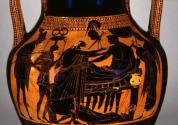Amphora (Storage Vessel);Front: the Ransom of the Body of Hector; Back: Warriors Departing
Artist: Attributed to Rycroft Painter (Greek)
Date: about 520-510 BCE
Dimensions:
H: 27 in. (68.6 cm); diam. of lip: 13 13/32 in. (34 cm); diam. of body: 17 23/32 in. (45 cm); diam of foot: 10 1/8 in. (25.74 cm); width of handles: 2 3/4 in. (7 cm)
Medium: wheel-thrown, slip-decorated earthenware
Classification: Ceramics
Credit Line: Purchased with funds from the Libbey Endowment, Gift of Edward Drummond Libbey
Object number: 1972.54
Label Text:I have borne what no man who has walked this earth has ever yet borne. I have kissed the hand of the man who killed my son. (Iliad, Book 24)
Aged King Priam of Troy visits the enemy Greek camp to beg the warrior Achilles for the body of his son Hektor, whom Achilles has killed in battle. Here white-haired Priam lurches toward Achilles, who heartlessly drinks over Hektor’s body. At the left, the god Hermes escorts a servant carrying the ransom to secure the body (a gold tripod and gold bowls). On the back is a scene of soldiers departing for war.
The Rycroft Painter, whose real name is unknown, is recognized for two stylistic quirks: drawing left hands as right (see Achilles and Hektor’s corpse) and ears in reverse (as on Achilles).
Aged King Priam of Troy visits the enemy Greek camp to beg the warrior Achilles for the body of his son Hektor, whom Achilles has killed in battle. Here white-haired Priam lurches toward Achilles, who heartlessly drinks over Hektor’s body. At the left, the god Hermes escorts a servant carrying the ransom to secure the body (a gold tripod and gold bowls). On the back is a scene of soldiers departing for war.
The Rycroft Painter, whose real name is unknown, is recognized for two stylistic quirks: drawing left hands as right (see Achilles and Hektor’s corpse) and ears in reverse (as on Achilles).
DescriptionBlack figure with incised details.
Not on view
In Collection(s)









